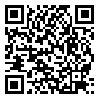Volume 11, Issue 4 (12-2022)
JCHR 2022, 11(4): 249-255 |
Back to browse issues page
Download citation:
BibTeX | RIS | EndNote | Medlars | ProCite | Reference Manager | RefWorks
Send citation to:



BibTeX | RIS | EndNote | Medlars | ProCite | Reference Manager | RefWorks
Send citation to:
Eftekhari A, Bakhtiari M, Kianimoghadam A S. The Relationship between the Attachment Styles of Children, Parenting Styles, and the Socio-Economic Status of parents. JCHR 2022; 11 (4) :249-255
URL: http://jhr.ssu.ac.ir/article-1-815-en.html
URL: http://jhr.ssu.ac.ir/article-1-815-en.html
1- Department Clinical Psychology, School of Medicine, Shahid Beheshti University of Medical Sciences, Tehran, Iran
2- Department Clinical Psychology, School of Medicine, Shahid Beheshti University of Medical Sciences, Tehran, Iran ,Maryam_bakhtiyari@sbmu.ac.ir
2- Department Clinical Psychology, School of Medicine, Shahid Beheshti University of Medical Sciences, Tehran, Iran ,
Abstract: (2924 Views)
Background: Family's socio-economic status may significantly influence parenting style. Therefore, this study aimed to investigate the relationship between attachment styles of 7 to 12-year-old children, parenting styles, and the socio-economic status of parents.
Methods: This was a cross-sectional and correlational study. The study population included 7 to 12 children who studied in elementary schools of Tehran in 2021. A sample of 95 individuals were selected by random sampling method and evaluated by questionares regarding Socio-Economic status (SE) (Ghodratnama, 2013), Parenting Style (PS) (Baumrind, 1973), Kinship Center Attachment (KCA) (Halpern and Kappenberg, 2006). The information obtained from the samples was analysed by Pearson correlation coefficient through SPSS 22 software. The level of significance was considered 5%.
Results: There was a a significant correlation between the attachment styles of the children and parenting styles and the socio-economic status of parents (r= -.284, p<0.01). In parenting styles there was a significant relationship between authoritive parenting style and positive adjustment (r= -.258, p<0.05), emotional reactivity (r= .218, p<0.05), negative behaviour (r= .394, p<0.01) and distancing from caregiver support (r= .407, p<0.01). There was also a significant relationship between authoritarian and positive adjustment (r= .315, p<0.01), negative behaviour (r= -.311, p<0.01), distancing from caregiver support (r= -.379, p<0.01). A significant relationship was observed between permissive and negative behavior (r= .232, p<0.05).
Conclusion: Both authoritative and permissive parenting styles seem to be dysfunctional. They cause different behavioural and emotional issues in children due to their attachment styles.
Methods: This was a cross-sectional and correlational study. The study population included 7 to 12 children who studied in elementary schools of Tehran in 2021. A sample of 95 individuals were selected by random sampling method and evaluated by questionares regarding Socio-Economic status (SE) (Ghodratnama, 2013), Parenting Style (PS) (Baumrind, 1973), Kinship Center Attachment (KCA) (Halpern and Kappenberg, 2006). The information obtained from the samples was analysed by Pearson correlation coefficient through SPSS 22 software. The level of significance was considered 5%.
Results: There was a a significant correlation between the attachment styles of the children and parenting styles and the socio-economic status of parents (r= -.284, p<0.01). In parenting styles there was a significant relationship between authoritive parenting style and positive adjustment (r= -.258, p<0.05), emotional reactivity (r= .218, p<0.05), negative behaviour (r= .394, p<0.01) and distancing from caregiver support (r= .407, p<0.01). There was also a significant relationship between authoritarian and positive adjustment (r= .315, p<0.01), negative behaviour (r= -.311, p<0.01), distancing from caregiver support (r= -.379, p<0.01). A significant relationship was observed between permissive and negative behavior (r= .232, p<0.05).
Conclusion: Both authoritative and permissive parenting styles seem to be dysfunctional. They cause different behavioural and emotional issues in children due to their attachment styles.
Review: Research |
Subject:
Public Health
Received: 2022/04/3 | Accepted: 2022/12/19 | Published: 2022/12/19
Received: 2022/04/3 | Accepted: 2022/12/19 | Published: 2022/12/19
Send email to the article author
| Rights and permissions | |
 |
This work is licensed under a Creative Commons Attribution 4.0 International License. |








